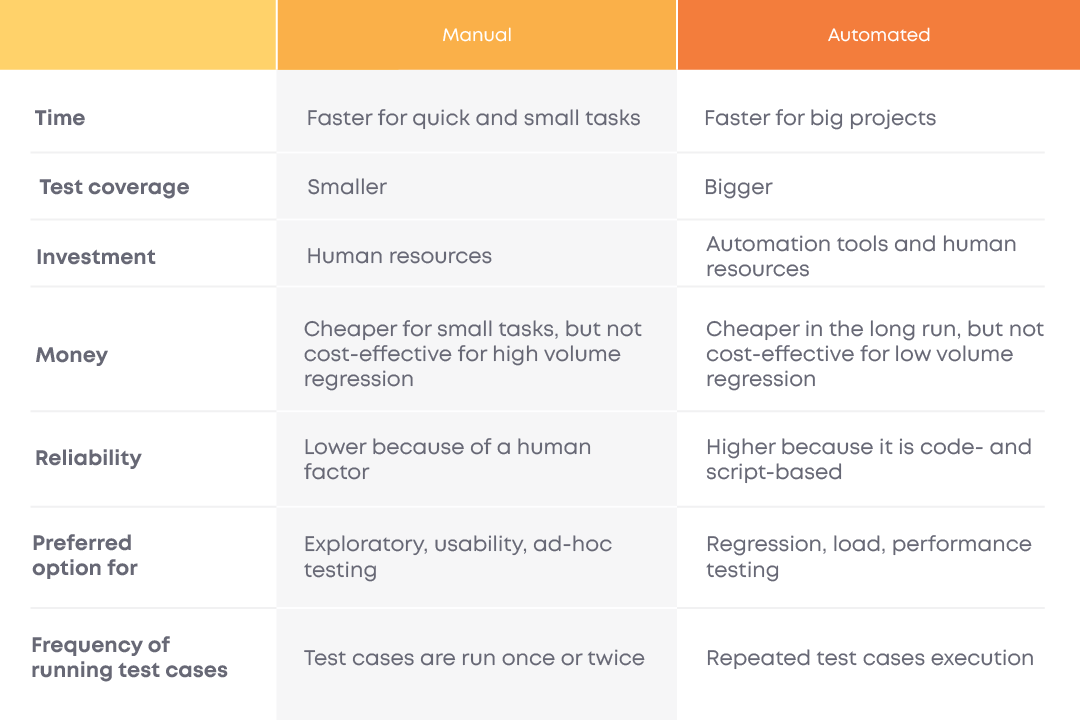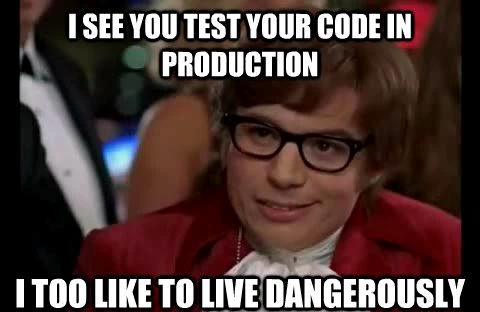You may have a dream team of developers who build an astonishing digital product for you. You may have the most creative designers who ensure app users fall in love with its flawless design and operation. At this point, you may think that these are the only people who craft a software product. But, actually, the whole app development lifecycle will be incomplete without involving quality assurance (QA) engineers.
What does QA stands for, who are QA engineers, and why may you want to have them on your team? Let’s figure it out together.
What Is Quality Assurance in Software Engineering?
Software quality assurance is the process that ensures the delivered application is in line with the given guidelines or set requirements. QA engineers guarantee that you get a digital product that meets your expectations (which are noted down in the corresponding documentation) and works smoothly.
How does quality assurance help software products?
There are numerous benefits of quality assurance in software testing as this process helps:
- Find any design or development defects, failures, or faults;
- Provide confidence in the quality of the app;
- Deliver information about the product status to decision-makers;
- Prevent defects that can occur during the product release, when making integrations or new app versions.
Can a Development Team Replace QA Engineers?
This question suggests a very simple answer – no if your goal is to get a high-quality app that is relevant to your needs. And here is why.
1. A QA Engineer Is a Whole Different Role
A person who is not directly involved in an app development process may assume that the QA engineer’s responsibilities can be easily handled by a developer. After all, it’s all about the code.
But things are a little bit more complicated. Developers WRITE the code and build an application. That’s what they were taught to do.
QA engineers, on their part, run manual and automated tests, create bug reports, write test cases, and perform other tasks. They are trained to do this job, thus, they know how to do it nicely and fast. For this, these experts have undergone professional training, taken courses, so have a QA qualification.
So, while development and quality assurance are tightly connected with the code, it doesn’t mean that developers and QA engineers do the same things. Therefore, requesting a developer to test the code is similar to asking an accountant to teach Math at school.

2. Different Mindsets

Have you seen the Wreck-It Ralph movie? It’s where Ralph and Felix were the main characters of the game. Ralph was the bad “wreck-it” guy and Felix was a “fix-it” type of a person.
We can think of QA engineers and developers as Ralph and Felix, where QA engineers take Ralph’s part. Why? Because one of their tasks is to break what developers have built. Let us explain.
In most cases, developers build features based on positive scenarios. It means that they concentrate on the flawless operation of the functionality without considering any side effects that may lead to bugs. QA engineers test different scenarios, including straightforward and unlikely user actions. This out-of-the-box thinking allows spotting even the tiniest bugs that may lead to the app crash or its improper operation.

3. To Err Is Human
It’s totally natural that people do not notice their own mistakes. There also may be a certain degree of rejection of the likelihood of making an error. And yes, these human-inherent patterns can be vividly traced in the behavior of many developers. So, QA engineers come to the rescue to show where the code doesn’t work for a common mission – to deliver a high-quality digital product that operates smoothly.
When developers write even a simple code numerous times, they may be prone to repetition blindness. It means that they assume that every single line of code they put out is correct by default, so may neglect the need to check it. That’s how simple mistakes happen. Not because the developer is ignorant, but because they are too focused on producing the code rather than testing it. So, they are totally involved in what they believe is their main work (coding), diminishing the testing value.

4. Focus on the Future
QA engineers are forward-looking folks who may warn the team about possible bugs right at the stage of setting requirements for the software product. They have a better understanding of how the features will interact, whether there may be logical errors, and more. This way, they save time developers can spend fixing the issues by preventing them from occurring. As you know, bugs are more expensive to fix than to prevent, especially at later stages of app development.

5. It’s All About Money and Efficiency
Finally, let’s think of the work of QA this way. Having a separate person dedicated to QA in software development may give more value to your project than you think.
First, it’s about the cost. Just so you know, the hourly rate of developers is higher compared to what QA engineers charge. So, every hour of QA engineers working on your software saves you money.
Second, think of QA from the standpoint of effectiveness. QA engineers significantly increase the amount of functionality that can be delivered during the same period. For a developer, every minute spent doing QA is a minute not spent writing the code.

A Disclaimer: A QA Engineer Is Not Almighty
There is a common misconception reading that a QA engineer MUST deliver a 100% bug-free product guarantee. But let’s face it.
It’s impossible to build a completely bug-free application.
|
So, the mission of a QA engineer is to minimize the number of defects and ensure the app meets the requirements. The idea of the QA process is to reduce the number of issues that may occur in production. For example, an application that avoided QA testing may have 10 bugs in production, while the one that had the QA team work on it may feature a decreased number of bugs – 1-2.
AQA or Manual Testing: What is the Best Choice for Your Project?
While both manual and automated testing do the same thing, there are differences between them. Let’s see what is the best testing strategy considering your project resources and other variables.
Manual testing is a meticulous method of testing by a QA specialist, who performs a test step-by-step without scripting or using automation tools. This is the oldest classic way of checking the product’s features, but it heavily relies on the human factor. Therefore, it may not be accurate.
Automated testing is the method of testing when the tester uses scripted sequences that are executed by testing tools to validate the software product functions as expected.
The chart below will help you get your mind about the most suitable testing method.

To Give You a Better Idea of Benefits From Having an AQA Engineer in Your Project
While we agree that both manual and automated QA have their own peculiarities and work beneficially in different scenarios, let us dig a little deeper in AQA.
This testing practice is a winning solution for big products, especially in cases when regression takes too much time and we need to make it shorter. Undoubtedly, AQA will result in a shorter testing time, which will help you cut the app delivery time and save money. Let us show you in what way.
For example, a manual tester will spend 15 minutes testing the use case. For the same use case, the automated QA specialist will need to write a script, which then will be used every time the test is run. It may take around a minute for an AQA tester to run the test once the script is ready. So, within 11-15 minutes, an AQA specialist will run around 3900 API tests, which only proves the time-saving value for large projects.
| Let us remind you. AQA is a winning solution for big projects. For short-sized projects, automation may not bring valuable time- and cost consumption reduction. |
How Much Does Quality Assurance Cost?
The rate of QA is a complex question as there will be differences depending on the engineers’ type of work, experience, and location.
QA outsourcing is a popular model as it opens access to the pool of the brightest talents without the need to keep them in-house. Usually, the hourly rate here varies from $7 to $40. Having an in-house QA engineer costs around $66K to $100K per year on average, which is considerably higher compared to outsourcing services or having a dedicated team working on your project.
How AQA Impacts Your ROI
When we talk about AQA’s ROI, it’s hard to talk about figures. In our understanding, and we hope you will agree with us, ROI should be described as the hard-to-quantify benefits of technology for an organization and its customers. In view of this, AQA ensures your company:
- Gets a stable application with a minimal number of bugs;
- Wins a good reputation and trust among users;
- Increases odds to boost monetization;
- Gains advantage over competitors’ products;
- Reduces the overall business costs due to less wastage and rectifications.
| ROI of AQA = the benefits of the automated regression testing – the cost of investment into script tests. |
At What Stage of Project Development Should You Hire a QA Engineer?
In a perfect world, you should hire a QA engineer as soon as possible. For example, when you work with ORIL and we assemble a team for your project from scratch, we include a QA specialist in the team architecture at the outset. This way, the tester grasps the software requirements better and can pinpoint possible issues and bugs at the stage of the requirements analysis.
When your product is already in the development stage, consider hiring a QA expert asap. Preferably, before the production. Just take it as a rule:
| The earlier you initiate the QA process and get the QA engineer to work, the less money you will spend on fixing the defects. |

Conclusion
Even when you are misled by the misconception that you do not need to hire a QA engineer because you work with highly experienced developers, you may want to reconsider your belief. The value you get from involving QA in software engineering is immense. Your investment will pay off by both improving the quality of the application and reducing the general cost of its development.







